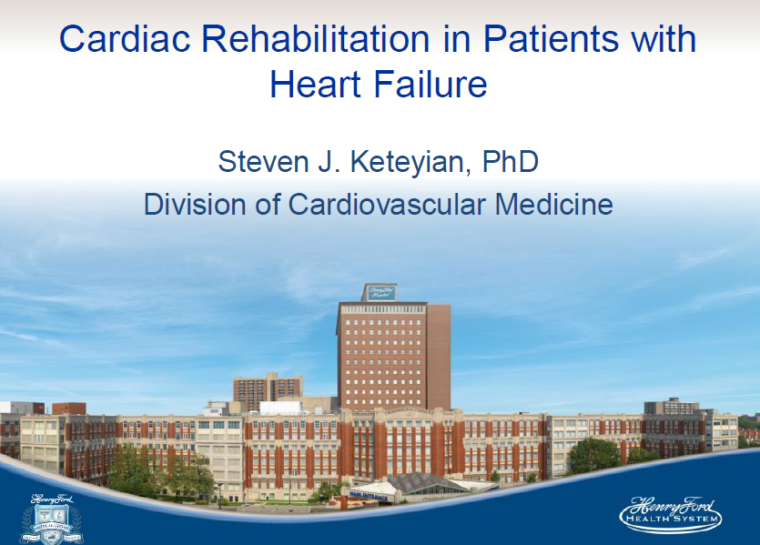At the most recent congestive heart failure MVC workgroup, Dr. Steven Keteyian, Section Head of the Cardiac Rehabilitation/Preventive Cardiology Unit at Henry Ford Medical Group, presented on exercise-based cardiac rehabilitation in patients with heart failure. Dr. Keteyian started out by discussing the importance of cardiac rehabilitation and adhering to a program in order to improve exercise tolerance and disease-specific outcomes. Exercise intolerance is measured and the information gathered can be used to stratify a patient’s future risk. If the measurement improves over time, Dr. Keteyian discussed the potential for a decrease in risk of death and re-hospitalization. This shows a tie to directly improving outcomes and symptoms in cardiac rehabilitation. Also, in the words of Dr. Keteyian, “functionally, the more they don’t do, the less they can do.”
Cardiac rehab is a Class I recommendation from The American College of Cardiology for all of the traditional cardiac disorders. Henry Ford has a 36-visit program that is anchored on exercise training. Between four and fifteen people are in each class and each person receives an individual treatment plan with a focus on bio-behavioral components. Six core components make up the program which include outcome assessments, supervised exercise, dietary/weight management, tobacco abuse, psychological support, and medication adherence. All participants participate in 30-minute behavioral education sessions which cover topics such as nutrition, dining out, proper exercise, medication compliance, and other relevant disease-management self-care activities. These same topics are also available on YouTube and can be found here, all of which are available for use in your cardiac rehab program. Currently, Henry Ford is working on bringing their time to enrollment after hospital discharge to less than 21 days and increasing adherence to the 36-visit program. The goal is to achieve a participation rate of 70% or more in cardiac rehab for Henry Ford’s patient population.
After discussing the program specifics at Henry Ford, Dr. Keteyian discussed the barriers that one may face in relation to participation in cardiac rehab. These barriers include:
- Demographic
- Difficulty contacting patient after hospitalization
- Return to work demands
- Transportation
- Co-payment obligations
- Dependent care responsibilities
Henry Ford is working at a system level in order to increase the percent of patients who gain access to cardiac rehab. This includes increasing the use of electronic medical record (EMR) driven automatic referrals, with an option for users to opt-out if necessary. Additionally, a member of the cardiac rehab team goes to the inpatient setting and talks to patients to establish a touchpoint before they leave the hospital. This five-minute conversation is all some patients need in order to see the importance and benefits of rehab. Lastly, Henry Ford is working to shorten the discharge to start time. Each day after discharge, the chance of getting patients started in rehab decreases by 1% for each day that passes. Henry Ford is working diligently in order to help decrease this risk.
In 2016, Henry Ford launched a hybrid home-based cardiac rehabilitation service. This includes some visits at the clinic and other virtual sessions. Previously being tied to a single visit at a time on their current streaming platform, Henry Ford will roll out a WebEx model in February 2021 that will allow up to six cardiac rehab appointments to occur at one time. This will provide more of a group setting. Currently, a randomized controlled trial is being done on center based cardiac rehab versus hybrid cardiac rehab. Improvements in fitness and the number of sessions attended are being assessed.
If you are interested in watching the entire workgroup, please click here. If interested in any information about this workgroup, or other MVC workgroups please email michiganvaluecollaborative@gmail.com
